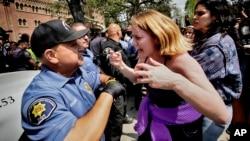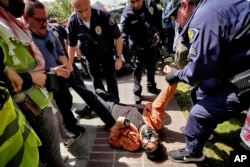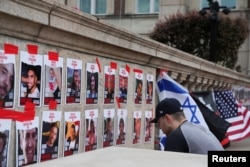Student Union
US police clash with students who demand colleges cut financial ties to Israel

Police tangled with student demonstrators in the U.S. states of Texas and California while new encampments sprouted Wednesday at Harvard and other colleges as school leaders sought ways to defuse a growing wave of pro-Palestinian protests.
At the University of Texas at Austin, hundreds of local and state police — including some on horseback and holding batons — clashed with protesters, pushing them off the campus lawn and at one point sending some tumbling into the street. At least 20 demonstrators were taken into custody at the request of university officials and Texas Governor Greg Abbott, according to the state Department of Public Safety.
A photographer covering the demonstration for Fox 7 Austin was arrested after being caught in a push-and-pull between law enforcement and students, the station confirmed. A longtime Texas journalist was knocked down in the mayhem and could be seen bleeding before police helped him to emergency medical staff who bandaged his head.
At the University of Southern California, police got into a back-and-forth tugging match with protesters over tents, removing several before falling back. At the northern end of California, students were barricaded inside a building for a third day at California State Polytechnic University, Humboldt. The school shut down campus through the weekend and made classes virtual.
Harvard University in Massachusetts had sought to stay ahead of protests this week by limiting access to Harvard Yard and requiring permission for tents and tables. That didn't stop protesters from setting up a camp with 14 tents Wednesday following a rally against the university's suspension of the Harvard Undergraduate Palestine Solidarity Committee.
Students protesting the Israel-Hamas war are demanding schools cut financial ties to Israel and divest from companies enabling its monthslong conflict. Dozens have been arrested on charges of trespassing or disorderly conduct. Some Jewish students say the protests have veered into antisemitism and made them afraid to set foot on campus.
Columbia University averted another confrontation between students and police earlier in the day. The situation there remained tense, with campus officials saying it would continue talks with protesters for another 48 hours.
On a visit to campus, U.S. House Speaker Mike Johnson, a Republican, called on Columbia University President Minouche Shafik to resign "if she cannot bring order to this chaos."
"If this is not contained quickly and if these threats and intimidation are not stopped, there is an appropriate time for the National Guard," he said.
Shafik had set a midnight Tuesday deadline to reach an agreement on clearing an encampment, but the school extended negotiations, saying it was making "important progress."
On Wednesday evening, a Columbia spokesperson said rumors that the university had threatened to bring in the National Guard were unfounded. "Our focus is to restore order, and if we can get there through dialogue, we will," said Ben Chang, Columbia's vice president for communications.
Columbia graduate student Omer Lubaton Granot, who put up pictures of Israeli hostages near the encampment, said he wanted to remind people that there were more than 100 hostages still being held by Hamas.
"I see all the people behind me advocating for human rights," he said. "I don't think they have one word to say about the fact that people their age, that were kidnapped from their homes or from a music festival in Israel, are held by a terror organization."
Harvard law student Tala Alfoqaha, who is Palestinian, said she and other protesters want more transparency from the university.
"My hope is that the Harvard administration listens to what its students have been asking for all year, which is divestment, disclosure and dropping any sort of charges against students," she said.
Columbia encampment inspires others
Police first tried to clear the encampment at Columbia last week, when they arrested more than 100 protesters. The move backfired, acting as an inspiration for other students across the country to set up similar encampments and motivating protesters at Columbia to regroup.
On Wednesday about 60 tents remained at the Columbia encampment, which appeared calm. Security remained tight around campus, with identification required and police setting up metal barricades.
Columbia said it had agreed with protest representatives that only students would remain at the encampment and they would make it welcoming, banning discriminatory or harassing language.
On the University of Minnesota campus, a few dozen students rallied a day after nine protesters were arrested when police took down an encampment in front of the library. U.S. Representative Ilhan Omar, whose daughter was among the demonstrators arrested at Columbia last week, attended a protest later in the day.
A group of more than 80 professors and assistant professors signed a letter Wednesday calling on the university's president and other administrators to drop any charges and to allow future encampments without what they described as police retaliation.
They wrote that they were "horrified that the administration would permit such a clear violation of our students' rights to freely speak out against genocide and ongoing occupation of Palestine."
Netanyahu encourages police response
Israeli Prime Minister Benjamin Netanyahu lashed out at the pro-Palestinian demonstrations on U.S. college campuses in a video statement released Wednesday, saying the response of several university presidents has been "shameful" and calling on state, local and federal officials to intervene.
Students at some protests were hiding their identities and declined to identify themselves to reporters, saying they feared retribution. At an encampment of about 40 tents at the heart of the University of Michigan's campus in Ann Arbor, almost every student wore a mask, which was handed to them when they entered.
The upwelling of demonstrations has left universities struggling to balance campus safety with free speech rights. Many long tolerated the protests, but are now doling out more heavy-handed discipline, citing safety concerns.
At New York University this week, police said 133 protesters were taken into custody and all had been released with summonses to appear in court on disorderly conduct charges. More than 40 protesters were arrested Monday at an encampment at Yale University.
See all News Updates of the Day
- By VOA News
Competition grows for international students eyeing Yale

It’s tough to gain admission to Yale University, and it’s getting even tougher for international students as standout students from around the world set their sights on Yale.
The Yale Dale News, the campus newspaper, takes a look at the situation here.
- By VOA News
Student from Ethiopia says Whitman College culture made it easy to settle in

Ruth Chane, a computer science major from Ethiopia, writes about her experiences settling into student life at Whitman College in the U.S. state of Washington.
"The community at Whitman College made sure I felt welcomed even before I stepped foot on campus," she says.
- By VOA News
Claremont Colleges student gets a shock when she heads home to Shanghai

In The Student Life, the student newspaper for the Claremont Colleges, a consortium of five liberal art colleges and two graduate schools in Claremont, California, student Rochelle Lu writes about readjusting to her Shanghai home after spending a semester in the United States.
- By VOA News
Cedarville University aims to ease transition for international students

Cedarville University in the U.S. state of Ohio says it’s got more than 140 international students representing 44 countries.
Here, the school interviews Jonathan Sutton, director of international student services. He talks about his job and the opportunities for international students on campus.
- By VOA News
Morehouse College offers prospective students tips on applying and thriving

Morehouse College, a private, historically Black liberal arts college in the U.S. state of Georgia, offers a guide for international students interested in attending the school.
Among the tips to apply and thrive at Morehouse:
- Take advantage of the school’s orientation program
- Turn to the school’s Center for Academic Success for tutoring, support and more
- Immerse yourself in campus life via clubs and societies
- By Reuters
US reviews Columbia University contracts, grants over antisemitism allegations

The administration of President Donald Trump said on Monday it will review Columbia University's federal contracts and grants over allegations of antisemitism, which it says the educational institution has shown inaction in tackling.
Rights advocates note rising antisemitism, Islamophobia and anti-Arab bias since U.S. ally Israel's devastating military assault on Gaza began after Palestinian Hamas militants' deadly October 2023 attack.
The Justice Department said a month ago it formed a task force to fight antisemitism. The U.S. Departments of Health and Education and the General Services Administration jointly made the review announcement on Monday.
"The Federal Government's Task Force to Combat Anti-Semitism is considering Stop Work Orders for $51.4 million in contracts between Columbia University and the Federal Government," the joint statement said.
The agencies said no contracting actions had been taken yet.
"The task force will also conduct a comprehensive review of the more than $5 billion in federal grant commitments to Columbia University."
The agencies did not respond to requests for comment on whether there were similar reviews over allegations of Islamophobia and anti-Arab bias.
Columbia had no immediate comment. It previously said it made efforts to tackle antisemitism.
College protests
Trump has signed an executive order to combat antisemitism and pledged to deport non-citizen college students and others who took part in pro-Palestinian protests.
Columbia was at the center of college protests in which demonstrators demanded an end to U.S. support for Israel due to the humanitarian crisis caused by Israel's assault on Gaza. There were allegations of antisemitism and Islamophobia in protests and counter-protests.
During last summer's demonstrations around the country, classes were canceled, some university administrators resigned and student protesters were suspended and arrested.
While the intensity of protests has decreased in recent months, there were some demonstrations last week in New York after the expulsion of two students at Columbia University-affiliated Barnard College and after New York Governor Kathy Hochul ordered the removal of a Palestinian studies job listing at Hunter College.
A third student at Barnard College has since been expelled, this one related to the occupation of the Hamilton Hall building at Columbia last year.
Canada’s immigration overhaul signals global shift in student migration
From Europe to North America, nations are tightening their immigration policies. Now Canada, long seen as one of the world's most welcoming nations, has introduced sweeping changes affecting international students. The reforms highlight a growing global trend toward more restrictive immigration policies. Arzouma Kompaore reports from Calgary.
Trump administration opens antisemitism inquiries at 5 colleges, including Columbia and Berkeley

The Trump administration is opening new investigations into allegations of antisemitism at five U.S. universities including Columbia and the University of California, Berkeley, the Education Department announced Monday.
It's part of President Donald Trump's promise to take a tougher stance against campus antisemitism and deal out harsher penalties than the Biden administration, which settled a flurry of cases with universities in its final weeks. It comes the same day the Justice Department announced a new task force to root out antisemitism on college campuses.
In an order signed last week, Trump called for aggressive action to fight anti-Jewish bias on campuses, including the deportation of foreign students who have participated in pro-Palestinian protests.
Along with Columbia and Berkeley, the department is now investigating the University of Minnesota, Northwestern University and Portland State University. The cases were opened using the department's power to launch its own civil rights reviews, unlike the majority of investigations, which stem from complaints.
Messages seeking comment were left with all five universities.
A statement from the Education Department criticized colleges for tolerating antisemitism after Hamas' Oct. 7, 2023, attack on Israel and a wave of pro-Palestinian protests that followed. It also criticized the Biden administration for negotiating "toothless" resolutions that failed to hold schools accountable.
"Today, the Department is putting universities, colleges, and K-12 schools on notice: this administration will not tolerate continued institutional indifference to the wellbeing of Jewish students on American campuses," said Craig Trainor, the agency's acting assistant secretary for civil rights.
The department didn't provide details about the inquiries or how it decided which schools are being targeted. Presidents of Columbia and Northwestern were among those called to testify on Capitol Hill last year as Republicans sought accountability for allegations of antisemitism. The hearings contributed to the resignation of multiple university presidents, including Columbia's Minouche Shafik.
An October report from House Republicans accused Columbia of failing to punish pro-Palestinian students who took over a campus building, and it called Northwestern's negotiations with student protesters a "stunning capitulation."
House Republicans applauded the new investigations. Representative Tim Walberg, chair of the Education and Workforce Committee, said he was "glad that we finally have an administration who is taking action to protect Jewish students."
Trump's order also calls for a full review of antisemitism complaints filed with the Education Department since Oct. 7, 2023, including pending and resolved cases from the Biden administration. It encourages the Justice Department to take action to enforce civil rights laws.
Last week's order drew backlash from civil rights groups who said it violated First Amendment rights that protect political speech.
The new task force announced Monday includes the Justice and Education departments along with Health and Human Services.
"The Department takes seriously our responsibility to eradicate this hatred wherever it is found," said Leo Terrell, assistant attorney general for civil rights. "The Task Force to Combat Anti-Semitism is the first step in giving life to President Trump's renewed commitment to ending anti-Semitism in our schools."
- By VOA News
STEM, business top subjects for international students

The Times of India breaks down the most popular subjects for international students to study in the U.S.
STEM and business lead the pack. Read the full story here. (January 2025)
- By VOA News
Safety and visa difficulties among misconceptions about US colleges

U.S. News & World report addresses some of the misconceptions about U.S. colleges and universities, including the difficulty of getting a visa.
Read the full story here. (January 2025)
- By VOA News
Work opportunities help draw international students to US schools

US News & World Report details the three top factors in foreign students' decision to study in the U.S. They include research opportunities and the reputation of U.S. degrees. Read the full story here. (December 2024)
- By VOA News
British student talks about her culture shock in Ohio

A British student who did a year abroad at Bowling Green State University in Ohio talks about adjusting to life in America in a TikTok video, Newsweek magazine reports.
Among the biggest surprises? Portion sizes, jaywalking laws and dorm room beds.
Read the full story here. (December 2024)
- By VOA News
Harvard's Chan School tells international students what to expect

Harvard's T.H. Chan School of Public Health reaches out to international students by detailing the international student experience at the school.
Learn more about housing, life in Boston and more here.
- By Reuters
China unveils plan to build 'strong education nation' by 2035

China issued its first national action plan to build a "strong education nation" by 2035, which it said would help coordinate its education development, improve efficiencies in innovation and build a "strong country."
The plan, issued Sunday by the Communist Party's central committee and the State Council, aims to establish a "high quality education system" with accessibility and quality "among the best in the world."
The announcement was made after data on Friday showed China's population fell for a third consecutive year in 2024, with the number of deaths outpacing a slight increase in births, and experts cautioning that the downturn will worsen in the coming years.
High childcare and education costs have been a key factor for many young Chinese opting out of having children, at a time when many face uncertainty over their job prospects amid sluggish economic growth.
"By 2035, an education power will be built," the official Xinhua news agency said, adding that China would explore gradually expanding the scope of free education, increase "high-quality" undergraduate enrolment, expand postgraduate education, and raise the proportion of doctoral students.
The plan aims to promote "healthy growth and all-round development of students," making sure primary and secondary school students have at least two hours of physical activity daily, to effectively control the myopia, or nearsightedness, and obesity rates.
"Popularizing" mental health education and establishing a national student mental health monitoring and early warning system would also be implemented, it said.
It also aims to narrow the gap between urban and rural areas to improve the operating conditions of small-scale rural schools and improve the care system for children with disabilities and those belonging to agricultural migrant populations.
The plan also aims to steadily increase the supply of kindergarten places and the accessibility of preschool education.
- By VOA News
A look at financial aid options for international graduate students in US

The Open Notebook, a site focusing on educating journalists who cover science, has complied a list of U.S. graduate program financial aid information for international students.

